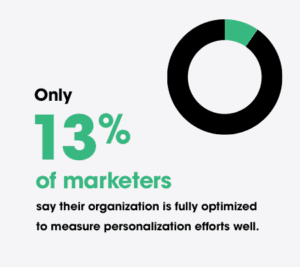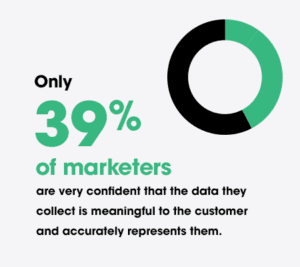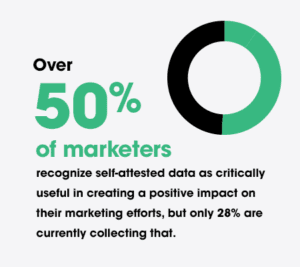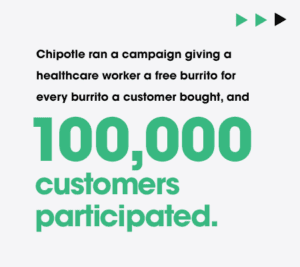There’s a simple rule in business: Give consumers who share common characteristics what they need, and you will build a repeatable revenue model. This concept is at the heart of personalized marketing and gives brands a powerful way to both understand and deliver what consumers want, at scale.
The promise is great. I learn the needs and wants of consumers through their digital click behavior and then provide offers and experiences that satisfy them.
If only it were that simple.
A new study conducted by Forrester Consulting and commissioned by SheerID reveals that marketers are struggling to realize the promise of personalization, and as a result are reduced to communicating with customers on a rudimentary basis. And their greatest obstacle is the very thing that personalization is based on: relevant, high-quality data.
Personalization Is a Top Goal but Elusive
Data-savvy customers demand personalization across all touchpoints. In response, brands are organizing their marketing efforts around improving personalization efforts. Nearly one-third of marketers report personalization as their team’s top focus for 2020, and another third rank it as important.
Yet marketers still struggle to make personalization work. Since the dawn of digital marketing, we’ve been measuring and analyzing customer behavior, but only 13% of marketers say their organization is fully optimized to measure personalization efforts well.
The problem is the data. It’s a critical component of personalization, but marketers report they don’t have what they need—and can’t fully use what they have. Nearly 1 in 2 marketers feel their data isn’t actionable, and only 14% say their data is well organized and usable.


3 Reasons Your Behavioral Data Is a Liability
Findings from the Forrester study suggest three reasons why marketers struggle with behavioral data in their personalization efforts:
01 The Quality of the Data Is Low
On average, 41% of the data marketers collect is anonymous, and when it’s not tied to an individual you can’t use it to create personalized experiences.
Forty-five percent of marketers say they can only do basic personalization, such as personalizing by the first name. And even worse, only 18% of marketers are very confident that their organization is able to protect the exclusivity of promotions for specific customer segments, which makes those offers extremely vulnerable to discount abuse.
And when marketers do have data, it’s often inaccurate. Only 39% of marketers are very confident that the data they collect is meaningful to the customer and accurately represents them.


02 Meaningful Action Is Difficult
Marketers gather consumer data from numerous sources, such as email, social, paid channels, and websites, which can make it challenging to pull together into a holistic and meaningful view. On average, marketers rely on three discrete sources of customer data, and that data sits in silos. It’s no surprise 52% report that insight from data takes a long time to receive.
03 Customer Trust Is Low
Consumers are wary of how data is collected and used, and regulations like the CCPA have made this even more difficult. When organizations overlook privacy, consumer trust and business performance suffer. In fact, 58% of US consumers are concerned about their online behaviors being tracked, and only 21% feel safe sharing their personal information online.
The Problem: We Don’t Ask Consumers, We Surveil Them
Marketers’ intentions have always been good—to build products and experiences consumers want. The problem is, they often leave consumers out of the equation.
Brands alienate consumers when they collect their data without their knowledge or consent. A shopper survey by Kelton Research found consumers prefer consent-based marketing models over inference-based approaches by a ratio of 2:1.
Many marketers compensate by trying to infer customer behavior from third-party sources, but without consumer input, they risk getting it wrong.
And getting true data is hard because most marketers don’t offer consumers real incentives when collecting it. If shoppers don’t have a reason to share their information, why would they?
The Solution: Personalize the Way You Collect Data
Marketers know the power of collecting consumer data directly from the source. Over 50% of marketers recognize self-attested data as critically useful in creating a positive impact on their marketing efforts. Unfortunately a paltry 28% are currently collecting that.
There’s good news, though. The way to get consumers to give you their data is to be thoughtful about how you collect it:
- Create a relationship. Directly ask consumers who they are and what they’re interested in.
- Put consumers in charge. Give them control of the process and they’ll feel empowered, not manipulated.
- Make it worth their while. Motivate them by giving them something of value in exchange for their data.


Two New Ways to Partner with Consumers to Collect Their Data
Identity Marketing
This is a new form of personalized marketing in which brands:
- Create a personalized offer based on a meaningful identity attribute, such as a career (teachers, first responders) or life stage (students, seniors). Buyers who share these attributes are called consumer communities.
- Invite the consumer to enjoy it, and ask them upfront to provide minimal data to receive it.
- Digitally verify eligibility to confirm consumers’ identity and demonstrate the offer is truly just for them. According to Kelton’s shopper study, roughly eight out of 10 consumers would shop with a retailer more often if presented with an offer that was truly exclusive to their community.
- Nurture the relationship by tailoring future offers to the preferences customers reveal.
Identity marketing is a respectful way for a brand to connect with influential consumer communities. It also generates tremendous goodwill among everyone else who supports them. In the wake of the pandemic, Chipotle ran a 4HEROES campaign giving a healthcare worker a free burrito for every burrito a customer bought, and in one day 100,000 customers participated.
“We saw a tremendous outpouring from our fans wanting to support these frontline workers with our buy one, give one campaign,” said Chris Brandt, Chief Marketing Officer of Chipotle.


Preference Centers
A preference center improves personalization by giving customers more control over how they interact with a brand:
- Jebbit helps brands deliver more targeted campaigns based on the “declared data” Jebbit generates through interactive experiences. For example, a travel brand can progressively query a travel customer’s preferences—where they like to go, how they spend their vacation budget—as they shop online.
- Wyng asks consumers directly and offers incentives such as coupons when they respond. For example, a beauty brand can help shoppers find the right haircare product through a short quiz and then email them a personalized recommendation and coupon code.
The Right Way to Personalize Is the Easiest Way
For more than a decade, marketers have done the best they could with the technology available to them. Newer technology like digital verification and preference centers make personalized marketing a lot less complicated.
Rather than surveilling customer click behavior and inferring what consumers want, brands can simply ask their customers and give them a good reason to provide an honest answer. This approach is an authentic way to engage consumers, and brands that take it up will be rewarded for it.
You can learn more about what 210 B2C marketers are doing and saying by reading the full study from Forrester Consulting.








